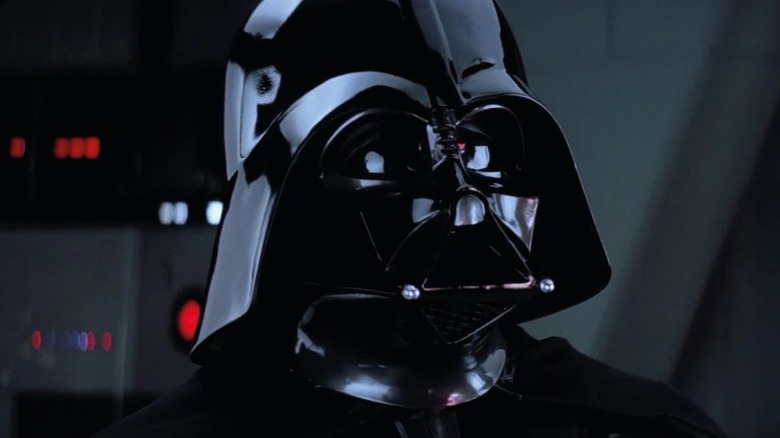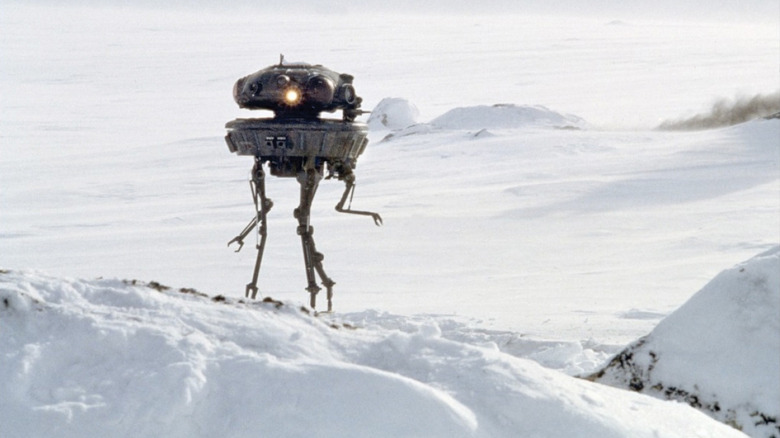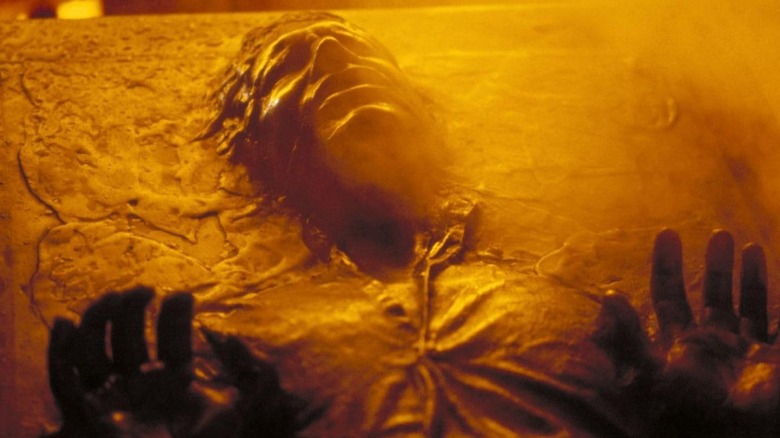A Tragic Death Hamstrung Rewrites For Star Wars: The Empire Strikes Back
It was revealed at the end of Irvin Kershner's 1980 sci-fi/fantasy film "The Empire Strikes Back" that the masked fascist warlock Darth Vader (David Prowse, voice by James Earl Jones) was secretly the father of the young hero Luke Skywalker (Mark Hamill). This information was shocking enough to echo through multiple generations, and the "villain is secretly related to the hero" twist has been repeated throughout much of popular media for decades. The revelation also famously contradicts dialogue from 1977's "Star Wars." Luke was previously told, by the reliable Obi-Wan Kenobi (Alec Guinness), that Darth Vader had killed Luke's father. The reason for Obi-Wan's deception has never been satisfactorily explained.
In the broader context of the "Star Wars" saga, the relationship between Darth Vader and Luke Skywalker has become a vital narrative fulcrum, but in the contained 1980-only context of just "Star Wars" and "The Empire Strikes Back," the twist doesn't make a lot of sense. It seems though, that it was a last-minute addition. Early drafts of "The Empire Strikes Back" didn't contain the now-famous familial twist.
The first draft of "The Empire Strikes Back" was written by Leigh Brackett, the Hugo-nominated author of "The Shadow Over Mars," "The Long Tomorrow," and dozens upon dozens of short stories. Brackett also wrote or co-wrote the screenplays for famously macho classic films like "The Big Sleep," "Rio Bravo," and "The Long Goodbye." The screenplay for "The Empire Strikes Back" was one of her final compositions, as she passed away in 1978 at the age of 62. F*** cancer.
In the February 2000 issue of Star Wars Insider Magazine, Kershner talked about Brackett's script, and how he, George Lucas, and Lawrence Kasdan felt the need to rework it and alter the film more to their liking.
No chance to re-write it
Kershner didn't reveal exactly why, but he wasn't wholly satisfied with Brackett's version of the story. Nor were, it seems, "Star Wars" creator George Lucas or "Empire" co-screenwriter Lawrence Kasdan. Kershner did say that Brackett's death, however, robbed production of a vital collaborator.
"I went up and met with George at his house, and he introduced me to a lot of the people working on it. Then, when the initial draft script came in, we weren't happy with it, but there was no chance to rewrite it, because the writer died. So we started meeting with Larry and reworking the script, and we all threw in ideas. I kept thinking in terms of character, George was thinking a lot more of the actual story, and then Larry was thinking of dialogue ... So it was a very good moment there. We worked for many weeks, and finally, we got the script."
Thanks to enterprising Starwoids, one can find copies of Brackett's initial draft, originally just called "Star Wars II," online. There were several key differences. In Brackett's script, for instance, there was meant to be a conventional love triangle between Han Solo (Harrison Ford), Princess Leia (Carrie Fisher), and Luke.
In the final film, Luke leaves the tutelage of Yoda (Frank Oz) to save his friends who are in danger. In Brackett's script, Luke completed his training and was officially knighted, notably by the ghosts of the deceased Obi-Wan and Anakin, Luke's father. And yes, the twist that Darth Vader was Luke's father wasn't part of Brackett's original vision.
More from Brackett's draft
Brackett also didn't end the film with Han Solo being frozen in carbonite and being sold to the bounty hunter Boba Fett. In Brackett's first draft, Han Solo revealed that he was the stepson of an off-screen character named Ovan Marekal, a high-ranking official in the Empire's bureaucracy. He was to leave the film's action and seek help from his estranged stepfather. Additionally, Lando (Billy Dee Williams) was going to be a clone, copied from an aristocratic family left over from the passingly-mentioned Clone Wars.
Also, Lando Calrissian's original name was Lando Kadar, while Yoda was initially named Bunden Debannen (or Buffy for short), before becoming Minch Yoda, eventually just shortened to Yoda. Brackett did include Yoda's famous line "There is another" in reference to an additional character that possesses the power of the Force, but her idea was to introduce a new character, Nellith, as Luke's long-lost sister. In the 1983 follow-up, Luke's long-lost sister was revealed to be Leia herself. This information was given by the ghost of Luke's father.
Brackett's script seems just as intriguing as the final version, which passed through Lucas' hands a few times before Kasdan took a pass at it. Kasdan and Brackett are the only credited screenwriters on the finished film.
It may take some imagination, but one might be able to picture a "Star Wars" saga without the surprise revelation that Darth Vader was Luke's father and that they merely represented opposite sides of the Force. Indeed, one might argue it would have improved Luke's story. Now he was a noble soul — a relatable everyman — caught up in a larger story. In Brackett's version, Luke was not inducted into a cosmic conflagration by birthright.


